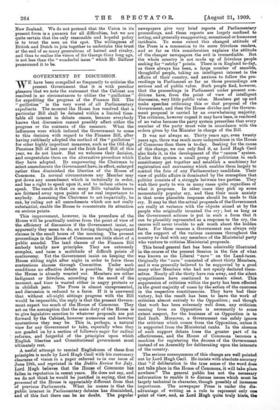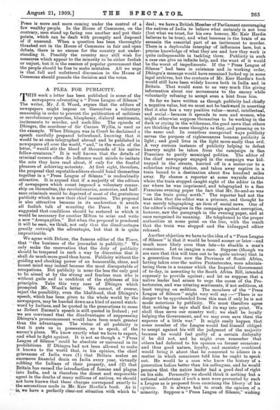GOVERNMENT BY DISCUSSION.
WE have been compelled so frequently to criticise the present Government that it is with peculiar pleasure that we note the statement that the Cabinet are resolved in no circumstances to utilise the " guillotine " for expediting the progress of the Finance Bill. The " guillotine " is the very worst of all Parliamentary expedients. The moment the House has resolved that a particular Bill shall be debated within a limited time- table all interest in debate ceases, because everybody knows that discussion cannot possibly affect either the progress or the contents of the measure. What the influences were which induced the Government to come to this decision with regard to the Finance Bill, after having ruthlessly adopted the method of the " guillotine " for other highly important measures, such as the Old-Age Pensions Bill of last year and the Irish Land Bill of this year, we do not know. But we welcome their decision, and congratulate them on the alternative procedure which they have adopted. By empowering the Chairman to select amendments the Government have, in effect, enlarged rather than diminished the liberties of the House of Commons. In normal circumstances any Member may put down any amendment which is technically in order, and has a right to speak upon it, and to induce others to speak. The result is that on many Bills valuable hours are frittered away upon points of no real importance to anybody. Assuming the Chairman to act impartially, lie can, by ruling out all amendments which are not really substantial, enable the House to concentrate its attention on serious points.
This improvement, however, in the procedure of the House will be practically useless from the point of view of the efficiency of discussion if the Government insist, as apparently they mean to do, on forcing through important clauses in the small hours of the morning. The present proceedings in the House of Commons are little short of a public scandal. The land clauses of the Finance Bill embody totally new principles. They are extremely complex, and raise a multitude of difficult points of controversy. Yet the Government insist on keeping the House sitting night after night in order to force these contentious clauses through Committee. Under such conditions no effective debate is possible. By midnight the House is already wearied out. Members are either indignant or frivolous, according to the mood of the moment, and time is wasted either in angry protests or in childish jests. The Press is almost unrepresented, and discussion is reduced to a farce. If it is answered that without all-night sittings progress with the Bill would be impossible, the reply is that the present Govern- ment expect too much of the House of Commons. They act on the assumption that the main duty of the House is to give legislative sanction to whatever proposals are put forward by the Cabinet, however numerous and however contentious they may be. This is, perhaps, a natural view for any Government to take, especially when they are goaded on by a section of followers eager for radical reforms, and forgetful of the principles upon which English liberties and Constitutional government must ultimately rest.
A useful attempt to remind Englishmen of these first principles is made by Lord Hugh Cecil with his customary clearness of vision in a paper referred to in our issue of June 19th, and reprinted in the Dublin Review for July. Lord Hugh believes that the House of Commons has fallen in reputation in recent years. He does not say, and we do not think he would be justified in saying, that the .personnel of the House is appreciably different from that of previous Parliaments. What he means is that the public interest in Parliamentary debates has diminished, and of this fact there can be no doubt. The popular newspapers give very brief reports of Parliamentary proceedings, and these reports are largely confined to noting, and generally exaggerating, sensational or humorous incidents. To some extent this changed attitude of the Press is a concession to its more frivolous readers, and so far as this consideration explains the attitude of the cheaper newspapers the evil is irremediable. But the whole country is not made up of frivolous people seeking for " catchy " points. There is in England to-day, as there always has been, a large number of sensible, thoughtful people, taking an intelligent interest in the affairs of their country, and anxious to follow the pro- ceedings in Parliament so far as those proceedings are serious and of public value. Such people find, however, that the proceedings in Parliament under present con- ditions have, from the point of view of intelligent discussion, very little public value. Members get up and make speeches criticising this or that proposal of the Government, and then the House divides and the Govern- ment proposal is carried by an overwhelming majority. The criticism, however cogent it may have been, is rendered of no value because the party system prescribes that every member of the party must vote in accordance with the orders given by the Minister in charge of the Bill.
It was not always so. Thirty years ago, even twenty years ago, there was much more independence in the House of Commons than there is to-day. Seeking for the cause of this change, we can only find it, as Lord Hugh Cecil also finds it, in the development of the " caucus " system. Under this system a small group of politicians in each constituency get together and establish a machinery for registration and canvassing which enables them largely to control the fate of any Parliamentary candidate. Their view of public affairs is dominated by the conception that politics consists of a struggle between two parties. They wish their party to win in many cases quite regardless of what it proposes. In other cases they pick up some momentarily popular cry, and then their main anxiety is that some plausible response should be made to this cry. It may be that the actual proposals of the Government are really at variance with the objects aimed at by the people who originally invented the cry ; but as long as the Government scheme is put in such a form that it can be plausibly represented as a response to the cry, the caucus will never trouble to ask much about the bidden facts. For these reasons a Government can always rely on the support of the various caucuses throughout the country to deal with any members of the Ministerial party who venture to criticise Ministerial proposals.
This broad general fact has been admirably illustrated in the course of the present Session in the fate of what was known as the Liberal " cave " on the Land-taxes. Originally the " cave " consisted of about thirty Members, and it was generally believed to be supported by a good many other Members who had not openly declared them- selves. Nearly all the thirty have run away, and the silent sympathisers have continued to remain silent. This suppression of criticism within the party has been effected in the great majority of cases by the action of the caucuses in the respective constituencies. They have had their victory, but the result has been to leave the work of criticism almost entirely to the Opposition ; and though that work has been extremely well done, any criticism coming from an Opposition is necessarily to some extent suspect, for the business of an Opposition is to find fault. Moreover, a Government can safely ignore the criticism which comes from the Opposition, unless it is supported from the Ministerial ranks. In the absence of such support debate loses the greater part of its effectiveness, and the House of Commons becomes a machine for registering the decrees of the Government instead of an Assembly for deliberating upon the interests of the country.
The serious consequences of this change are well pointed out by Lord Hugh Cecil. He insists with absolute accuracy that "if deliberation in the true sense of the word does not take place in the House of Commons, it will take place nowhere." The general public has not the necessary information to enable it to discuss issues which must be largely technical in character, though possibly of immense importance. The newspaper Press is under the dis- advantage of writing as a rule to represent only ono point of view, and, as Lord Hugh quite truly hints, the Press is more and more coming under the control of a few wealthy people. In the House of Commons, on the contrary, men stand up facing one another and put their points, which can be dealt with promptly and disposed of if unsound. When a question has been thoroughly thrashed out in the House of Commons in fair and open debate, there is no excuse for the country not under- standing it. Possibly the country may still wish for measures which appear to the minority to be either foolish or unjust, but it is the essence of popular government that the people should be free to make mistakes. All we urge is that full and unfettered discussion in the House of Commons should precede the decision and the votes.







































 Previous page
Previous page